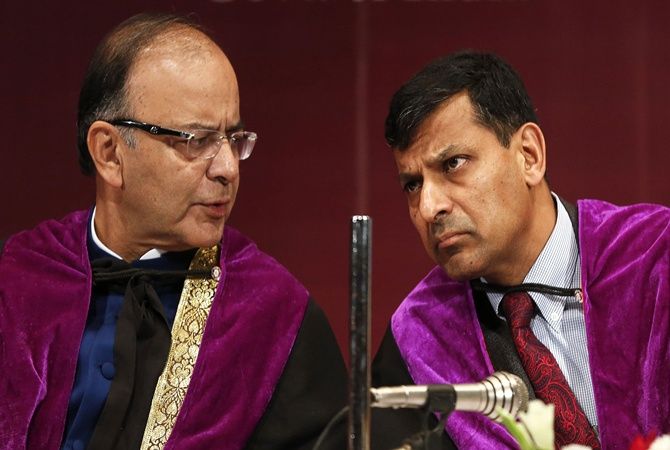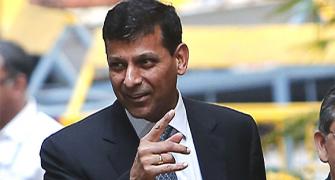With Raghuram Rajan not 'really there', the FinMin has decided to keep a watch on market developments this week with all key officials on the job.
Subhomoy Bhattacharjee reports.

This is because even in internal discussions Finance Minister Arun Jaitley had given no indication for an extension for the RBI governor.
The finance ministry was prepared for Reserve Bank of India Governor Raghuram Rajan's Saturday evening communication to central bank employees that he would not seek a second term.
Despite the day being a holiday, Finance Minister Arun Jaitley was scheduled to attend an event at North Block at 5.30 pm. He was at his office when the communication from Rajan hit the cyberspace.
The minister had a meeting with secretaries in the ministry soon thereafter. The formal position taken by the ministry thanking Rajan for the 'good work' was endorsed and by 6.52 pm Jaitley had put out his message accepting the decision on his Facebook page.
Nobody from the ministry could obviously influence the outgoing RBI governor about the timing of his decision.
But nobody failed to notice that Monday onwards the currency markets will be watching how the Brexit vote plays out. The voting is on Thursday.
There had been no communication from the Prime Minister's Office about the developments regarding Rajan's exit to the finance ministry.
For India, the worry is about a possible dip in the value of the rupee.
If British citizens vote to exit the European Union, the pound will weaken and that in turn would lead to a rally in the dollar.
Such a rally will encourage currency speculators to move out of emerging markets for some time to invest in the dollar.
With Rajan not 'really there', the finance ministry has decided to keep a watch on developments this week with all key officials on the job.
India has strong foreign exchange reserves and it does not expect the blip to be more than temporary. However, the impact of the governor's decision is expected to have some additional effect on the currency market.
For the government, the priority now is to populate the Monetary Policy Committee with members ahead of the third bi-monthly monetary policy statement on August 9.
The rules for the committee that will set the interest rates for the economy from now on are being cleared up between the finance and the law ministries.
While it was expected that the three members to be appointed by the government would be in place by late July, it will now be necessary to bring the date line closer.
It is the Monetary Policy Committee which will now effectively set the rates in the August meeting and so the need to give them time to get prepared is essential.
North Block seems to have been prepared for the missive from Rajan for some time expecting no second term for him. This is because even in internal discussions Jaitley had given no indication for an extension.
Few were, however willing to give much credence to the comments from Bharatiya Janata Party MP Subramanian Swamy as the reason for Rajan announcing his exit now.
It was a larger set of differences which had built up between the RBI governor and the government over the lack of flow of credit, particularly to small and medium enterprises that had loomed large.
There have been plenty of comments from members of standing committees in Parliament for which they perceived a lack of response from the RBI about those concerns.
Matters had soured when Rajan sent a letter to Jaitley early this year about the need for sticking to the fiscal deficit targets set for 2015-2016. The letter was read as interference by the monetary authority on the fiscal policy of the government.









